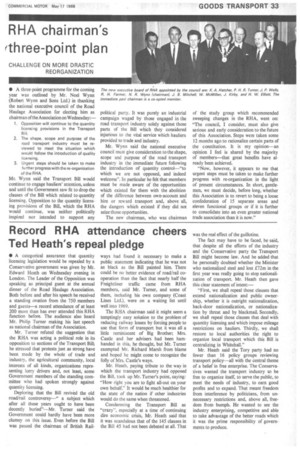Record RHA attendance cheers Ted Heath's repeal pledge
Page 35

If you've noticed an error in this article please click here to report it so we can fix it.
• A categorical assurance that quantity licensing legislation would be repealed by a Conservative government was given by Mr. Edward Heath on Wednesday evening in London. The Leader of the Opposition was speaking as principal guest at the annual dinner of the Road Haulage Association. Both before and after his speech he received a standing ovation from the 750 members and guests—a record attendance of at least 200 more than has ever attended this RHA function before. The audience also heard Mr. Philip Turner making his last speech as national chairman of the Association.
Mr. Turner refuted the suggestion that the RHA was acting a political role in its opposition to sections of the Transport Bill; he stressed that protests just as strong have been made by the whole of trade and industry, the agricultural community, local interests of all kinds, organizations representing lorry drivers and, not least, some Government members of the standing committee who had spoken strongly against quantity licensing.
Deploring that the Bill revived the old road/rail controversy—" a subject which after all these years ought to have been decently buried"—Mr. Turner said the Government could hardly have been more clumsy on this issue. Even before the Bill was passed the chairman of British Rail
ways had found it necessary to make a public statement indicating that he was not as black as the Bill painted him. There could be no better evidence of road/rail cooperation than the fact that nearly half the Freightliner traffic came from RHA members, said Mr. Turner, and some of them, including his own company (Coast Lines Ltd.), were on a waiting list until well into 1969.
The RHA chairman said it might seem a temptingly easy solution to the problem of reducing railway losses by forcing people to use that form of transport but it was all a little reminiscent of Big Brother; Mrs. Castle and her advisers had been hamhanded in this, he thought, but Mr. Turner exempted Mr. Richard Marsh from blame and hoped he might come to recognize the folly of Mrs. Castle's ways.
Mr. Heath, paying tribute to the way in which the transport industry had opposed the Bill, took up Mr. Turner's point, saying: "How right you are to fight all-out on your own behalf." It would be much healthier for the state of the nation if other industries would do the same when threatened.
Condemning the Transport Bill as "crazy", especially at a time of continuing dire economic crisis, Mr. Heath said that it was scandalous that of the 145 clauses in the Bill 45 had not been debated at all. That was the real effect of the guillotine.
The fact may have to be faced, he said, that despite all the efforts of the industry and the Conservative party the Transport Bill might become law. And he added that he personally doubted whether the Minister who nationalized steel and lost £72m in the first year was really going to stop nationalization of transport. Mr. Heath then gave this clear statement of intent:—
"First, we shall repeal those clauses that extend nationalization and public ownership, whether it is outright nationalization, back-door nationalization, or nationalization by threat and by blackmail. Secondly, we shall repeal those clauses that deal with quantity licensing and which impose mileage restrictions on hauliers. Thirdly, we shall restore to local authorities the right to organize local transport which this Bill is centralizing in Whitehall."
Mr. Heath said the Tory party had no fewer than 16 policy groups reviewing transport policy—all with the central theme of a belief in free enterprise. The Conservatives wanted the transport industry to be free to organize itself, to serve the public, to meet the needs of industry, to earn good profits and to expand. That meant freedom from interference by politicians, from unnecessary restrictions and, above all, freedom from bumph. He wanted to see the industry enterprising, competitive and able to take advantage of the better roads which it was the prime responsibility of governments to produce.




























































































































